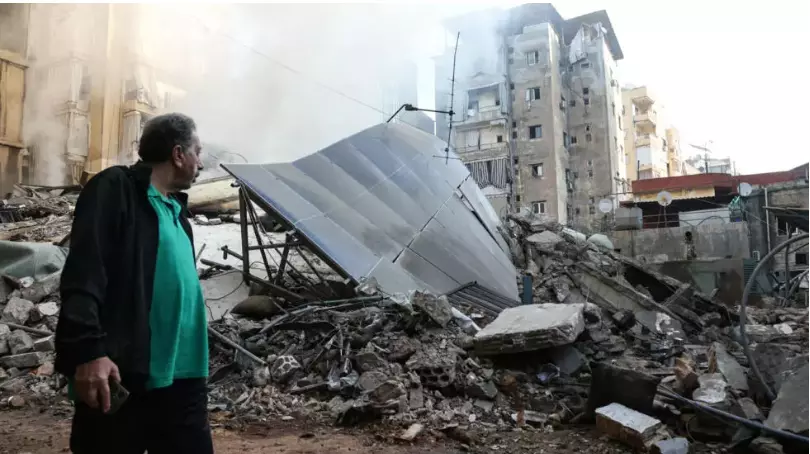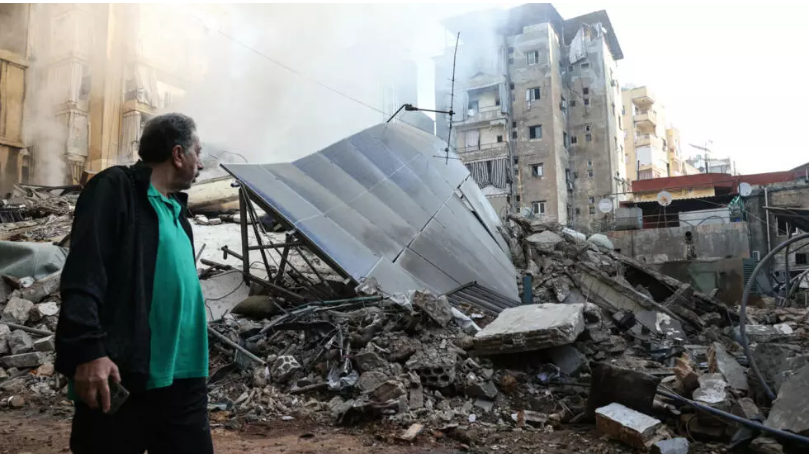
Beirut: An Israeli air strike in central Beirut killed at least four people early Saturday, bringing down a residential building and jolting residents across the city out of bed as Israel kept up its air campaign against Hezbollah.
The attack was followed by others in the city’s southern suburbs after calls by Israel’s military to evacuate the area.
Rescue operations were underway at the site of the first strike on Saturday morning, with an excavator removing the rubble of the eight-storey building, and a fire truck and civil defence rescuers stationed nearby as people gathered around the site.
Lebanon’s National News Agency reported that Beirut “woke up to a horrific massacre”, after Israeli jets hit the building in the working-class Basta neighbourhood.
The NNA said Israeli jets had launched six missiles at the structure, causing “widespread destruction in buildings” nearby
The strike “killed four people and injured 23 others”, Lebanon’s health ministry said in a statement, giving a preliminary toll.
The predawn attack in Basta was not preceded by an evacuation warning from Israel’s military. Similar strikes carried out without warning outside of Hezbollah’s traditional bastions have tended to target high-level members.
Neither Israel nor Hezbollah have yet commented on the strike.
The second strike hit the neighbourhood of Hadath in Beirut’s southern suburbs, which are a stronghold of Hezbollah.
Israel stepped up its campaign against the Iran-backed group in late September, targeting areas where it holds sway in the country’s east, south and south Beirut, and later sending in ground troops after nearly a year of limited cross-border exchanges of fire.
Lebanon’s health ministry says at least 3,645 people have been killed since October 2023, when Hezbollah initiated cross-border clashes with Israel in solidarity with its Palestinian ally Hamas over the Gaza war. Most of the deaths have been since September this year.
The war in Gaza was triggered by Hamas’s unprecedented October 7, 2023 attack on southern Israel, which resulted in the deaths of 1,206 people, mostly civilians, according to an AFP tally of Israeli official figures.
At least 44,056 people have been killed in Gaza during more than 13 months of war, most of them civilians, according to figures from Gaza’s health ministry which the United Nations considers reliable.
Mahmud Bassal, spokesman for Gaza’s civil defence agency, told AFP on Saturday that “19 people were killed and more than 40 others wounded in three massacres” caused by predawn Israeli air strikes and tank fire.
The war has created a humanitarian crisis in the besieged territory, where people are experiencing widespread shortages of food, fuel and medicine.
Marwan al-Hams, director of Gaza’s field hospitals, told reporters on Friday that all hospitals in the Palestinian territory “will stop working or reduce their services within 48 hours due to the occupation’s (Israel’s) obstruction of fuel entry”.
Late on Thursday, the UN’s humanitarian coordinator for the Palestinian territories, Muhannad Hadi, said aid delivery was “grinding to a halt”, adding that for more than six weeks, Israeli authorities “have been banning commercial imports” while “a surge in armed looting” has hit aid convoys.
The United Nations and others have repeatedly decried humanitarian conditions, particularly in northern Gaza, where Israel said Friday it had killed two commanders involved in Hamas’s October 7 attack.
Vowing to stop Hamas from regrouping, Israel on October 6 began a renewed air and ground operation in the north.
Gaza’s health ministry says the operation has killed thousands.
The UN says more than 100,000 have been displaced from the area, and an official told the Security Council last week that people “are effectively starving”.
The Hague-based International Criminal Court announced on Thursday that it had issued arrest warrants for Israeli Prime Minister Benjamin Netanyahu and former defence minister Yoav Gallant over their conduct of the war in Gaza.
The court said there were “reasonable grounds” to believe the pair bore “criminal responsibility” for the war crime of starvation as a method of warfare and crimes against humanity, including over “the lack of food, water, electricity and fuel, and specific medical supplies”.
A furious Netanyahu said: “Israel rejects with disgust the absurd and false actions and accusations made against it.”
The ICC also issued a warrant for Hamas military chief Mohammed Deif, saying it had grounds to suspect him of war crimes and crimes against humanity over the October 7 attack on Israel, including “sexual and gender-based violence” against hostages.
Israel said it killed Deif in July, but Hamas has not confirmed his death.
Since Israel expanded the focus of its war from Gaza to Lebanon, it has also intensified strikes on neighbouring Syria, a key conduit of weapons for Hezbollah from its backer Iran.
The Syrian Observatory for Human Rights said on Friday that Israeli strikes targeting three sites in Palmyra earlier in the week had killed 92 pro-Iran fighters.
One of them hit a meeting of pro-Iranian groups that involved commanders from Hezbollah and Iraq’s Al-Nujaba group.
